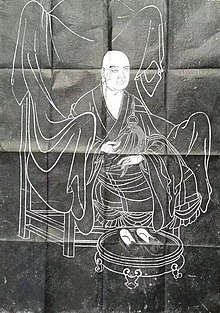Our website is made possible by displaying online advertisements to our visitors.
Please consider supporting us by disabling your ad blocker.
Woncheuk
| Woncheuk | |
 | |
| Korean name | |
|---|---|
| Hangul | 원측 |
| Hanja | 圓測 |
| Revised Romanization | Woncheuk |
| McCune–Reischauer | Wŏnch'ŭk |
Woncheuk (Korean: 원측; MR: Wŏnch'ŭk, c. 613–696) was a Korean Buddhist monk who worked in seventh century China.[1] Woncheuk was a follower of Paramārtha (499-569) and the Shelun school of Yogacara. This school defended the view that there was a ninth consciousness called the "pure consciousness" (amalavijñāna), as opposed to just the eight consciousnesses of classical Yogacara. This position had been rejected by Xuanzang and Kuiji.[2] Woncheuk later became a student of Xuanzang (ca. 600–664) and worked in his translation team.[1] Woncheuk's works attempt to reconcile the two traditions of East Asian Yogacara and often diverges from the interpretations of Xuanzang and Kuiji in favor of the views of Paramārtha.[1]
Woncheuk's work was revered throughout China and Korea, even reaching Chinese rulers like Emperors Taizong, Gaozong of Tang and Empress Wu of Zhou.[3] Woncheuk's exegetical work also influenced Tibetan Buddhism and the greater Himalayan region.
- ^ a b c Buswell, Robert E. (2004). Encyclopedia of Buddhism, 'Wŏnch'ŭk', p. 903. Volumes 1,2. Macmillan Reference.
- ^ "Woncheuk 원측". The Treasury of Lives. Retrieved 2022-11-11.
- ^ Benjamin Penny (2002), Religion and Biography in China and Tibet, p. 110
Previous Page Next Page


